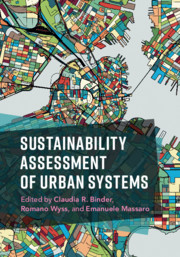Book contents
- Sustainability Assessment of Urban Systems
- Sustainability Assessment of Urban Systems
- Copyright page
- Contents
- Preface
- Acknowledgments
- Contributors
- General Introduction
- Part I Theoretical Background
- 1 Sustainability Assessment: Introduction and Framework
- 2 Systems Science and Sustainability Assessment
- 3 How Values Play into Sustainability Assessments: Challenges and a Possible Way Forward
- 4 The Politics of Participatory Sustainability Assessments: An Analysis of Power
- 5 A Concept for Sustainability Transition Assessment (STA): A Dynamic Systems Perspective Informed by Resilience Thinking
- Part II Integrative Approaches for Sustainability Assessment
- Part III Perspectives on Urban Sustainability
- Part IV Focal Points of Urban Sustainability
- Index
- References
3 - How Values Play into Sustainability Assessments: Challenges and a Possible Way Forward
from Part I - Theoretical Background
Published online by Cambridge University Press: 27 March 2020
- Sustainability Assessment of Urban Systems
- Sustainability Assessment of Urban Systems
- Copyright page
- Contents
- Preface
- Acknowledgments
- Contributors
- General Introduction
- Part I Theoretical Background
- 1 Sustainability Assessment: Introduction and Framework
- 2 Systems Science and Sustainability Assessment
- 3 How Values Play into Sustainability Assessments: Challenges and a Possible Way Forward
- 4 The Politics of Participatory Sustainability Assessments: An Analysis of Power
- 5 A Concept for Sustainability Transition Assessment (STA): A Dynamic Systems Perspective Informed by Resilience Thinking
- Part II Integrative Approaches for Sustainability Assessment
- Part III Perspectives on Urban Sustainability
- Part IV Focal Points of Urban Sustainability
- Index
- References
Summary
Any sustainability assessment uses some notion of sustainability as a reference. It is increasingly acknowledged that sustainability is a contested concept and that its different definitions are rooted in different values. Accordingly, researchers have started to develop approaches for producing knowledge in a context of diverging values. However, little attention has been paid to these values and to how they play into sustainability assessments. In this chapter, we address this question in three parts. First, we show how different ethical positions and worldviews enter notions of sustainability and shape the solution spaces for sustainability issues which are taken into consideration. Secondly, we present different stances on how the scientific method should address the presence of values and show how they can be traced back to different values about what good science is. Thirdly, we show that values are historically constructed and shaped by the socioeconomic, socio-technological, and socio-ecological order and at the same time contribute to reproducing it. We also show that this process risks leading to a prevalence of notions of sustainability that reproduce the very dynamics at the origin of the sustainability problem at hand. We conclude the chapter with recommendations for how this challenge could be overcome.
- Type
- Chapter
- Information
- Sustainability Assessment of Urban Systems , pp. 65 - 86Publisher: Cambridge University PressPrint publication year: 2020

